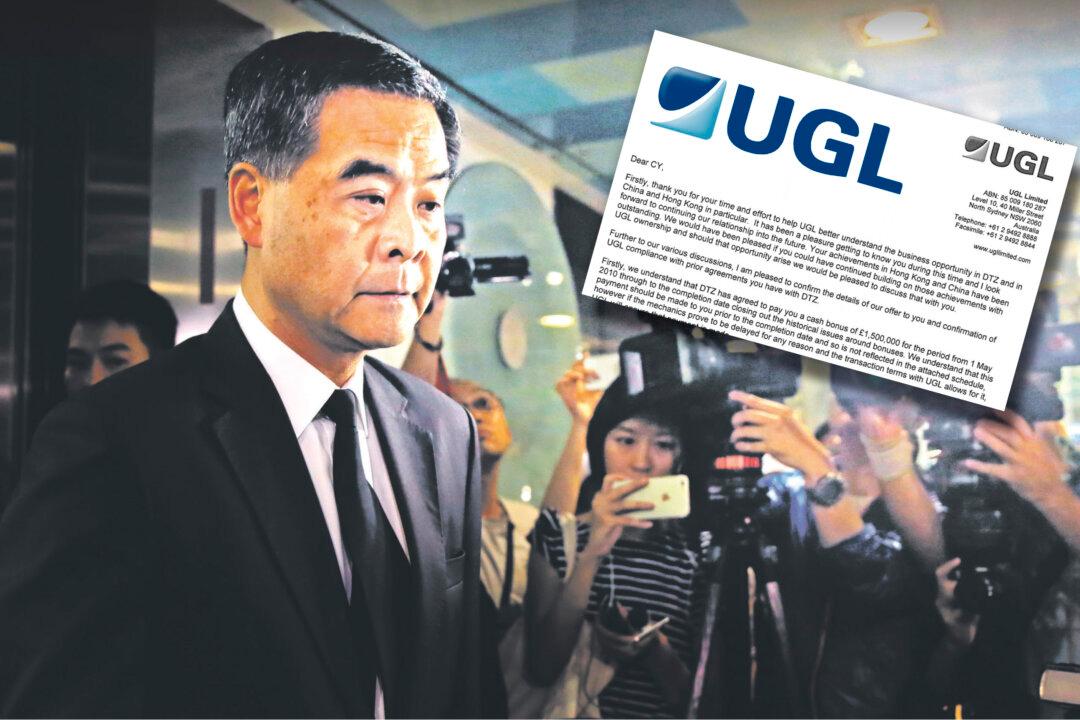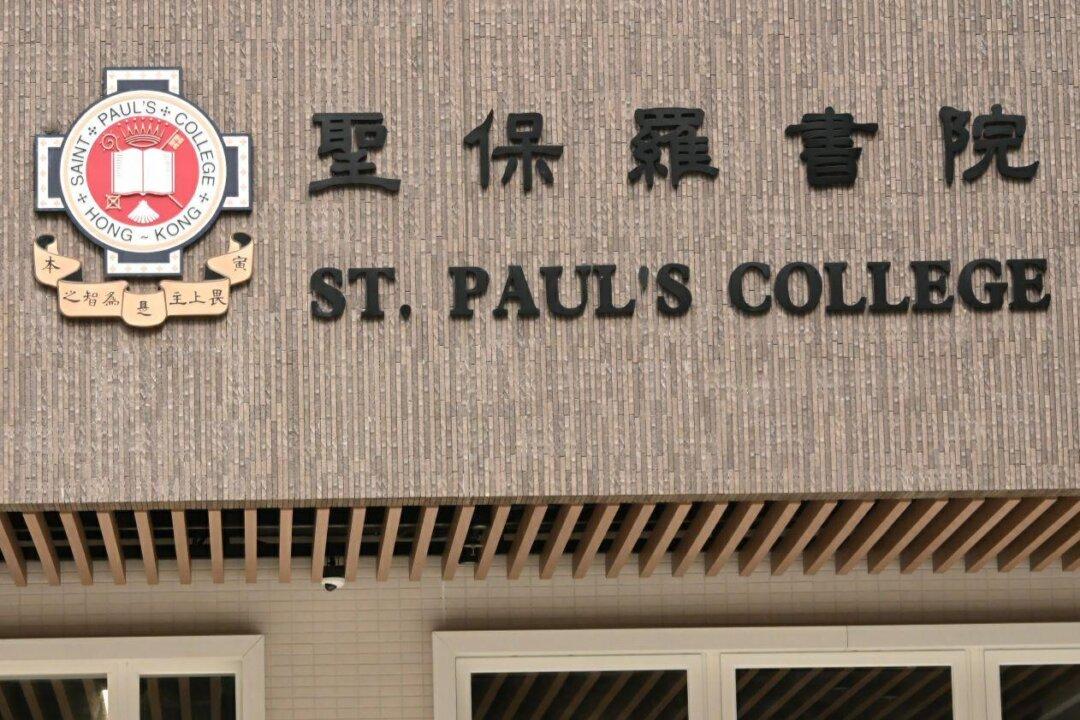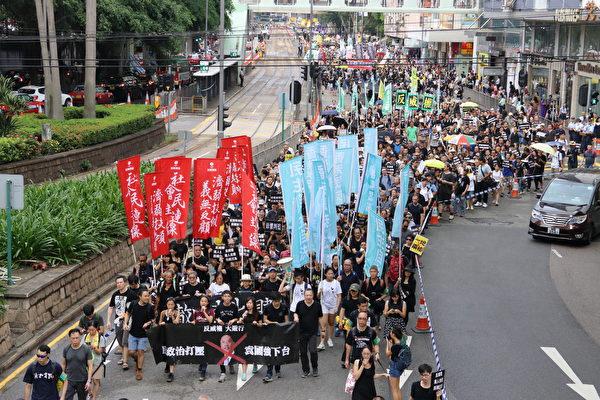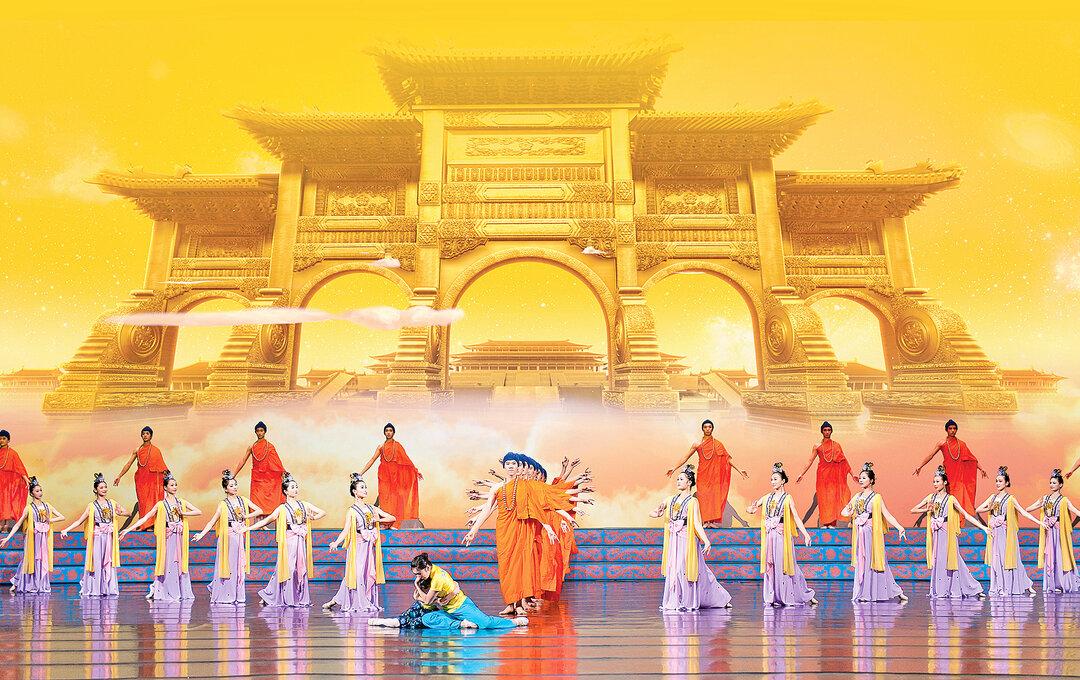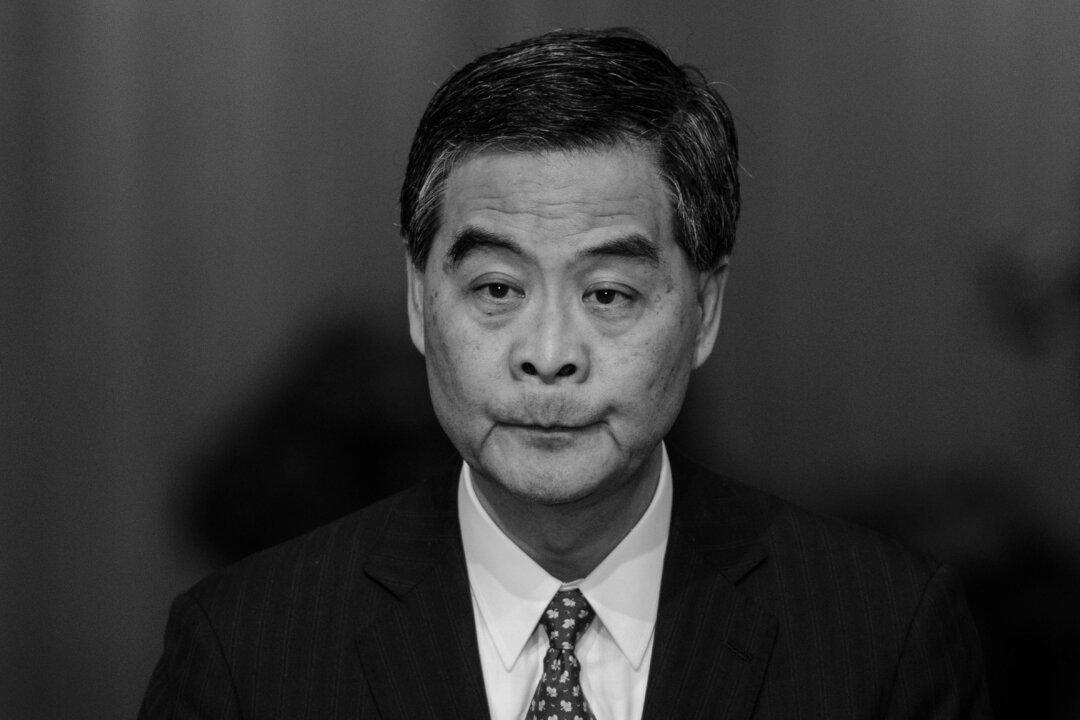Chairman of the National People’s Congress (NPC) Zhang Dejiang’s three-day visit to Hong Kong in May might not have turned out the way he had been hoping for.
Analysts believe that Zhang came to Hong Kong in the name of participating in the “One Belt, One Road” forum, but the real reason was to give Chief Executive Leung Chun-ying a boost.
However, four pan-democratic Legislative Council (LegCo) legislators expressed their dissatisfaction with Chief Executive Leung Chun-ying and accused him of taking secret payments of HK$50 million from the Australian engineering company UGL.
Soon after Zhang returned to Beijing, the news spread that the General Office of the Central Committee directly under the control of Chinese leader Xi Jinping had already sent people to Hong Kong to investigate Leung’s receipt of the HK$50 million. The investigators have compiled a report on the secret payment from UGL, which will be used to discourage Leung from entering re-election.
On May 23, Yu Jinxian, a political issue columnist for the Hong Kong Economic Journal, quoted news from political circles that are familiar with the central government, stating that the General Office sent investigators to Hong Kong in April and May this year to collect relevant information. The information included the evaluation of Leung from different sectors of the society, especially the opinion on the UGL incident.
Zhang is a member of the Politburo and a supporter of Xi’s political rival, former Chinese Communist Party (CCP) leader Jiang Zemin. During Zhang’s stay in Hong Kong, he repeatedly expressed his support for Leung, especially Leung’s playing down of Hong Kong independence.
However, the focus of Hong Kong society is on the pan-democratic legislators’ face-to-face demand that Leung be dismissed. Even the pro-Beijing camp did not express support for Leung’s re-election.
Analysts think that Xi is accelerating the steps toward arresting Leung.
According to an authoritative news source, Leung will not have many more days in power. Once former Chinese vice president Zeng Qinghong is arrested, the next to fall will be Leung.
Xi will set tone for Hong Kong policies
The Economic Journal political issue column continued, “Beijing has just completed an investigative report on the UGL incident. The report covers opinions from influential Hong Kong legal experts, who provided their analysis on whether Leung will be prosecuted by the Independent Commission Against Corruption (ICAC), and the potential risk of being pursued by the UK and Australia.”
The column added that Xi will personally preside over next month’s enlarged meeting for Central Coordination Group for Hong Kong and Macau Affairs, and he will set the tone for policies on Hong Kong.
Political analysts believe that Beijing wants to seize on Leung’s weak points in order to discourage him from attempting re-election.
Leung may face prosecution
When Civic Party leader Alan Leong Kah-kit met with Zhang, during his visit, he reprimanded Leung’s corrupt behaviour, including an unauthorized building works incident during the Chief Executive election period, taking the secret UGL payment, and allegedly acting as adviser and referee for UGL during his tenure as Chief Executive.
Leong believes Beijing could discourage Leung from re-entering the Chief Executive election due to the severity of the UGL scandal.
“If there is a high possibility of facing criminal prosecution or civil penalty, it is definitely possible to ask him to resign or at least not to seek re-election,” Leong said.
In 2012, former Chief Executive Donald Tsang was accused of taking magnates’ hospitality. The incident triggered wide social concern that certain provisions of the Prevention of Bribery Ordinance would not restrain the Chief Executive.
Subsequently, the Independent Review Committee for the Prevention and Handling of Potential Conflicts of Interest was set up and chaired by Andrew Li Kwok-nang, former Chief Judge of the Hong Kong Court of Final Appeal. The Committee reviewed the interest declaration system for the Chief Executive, members of the Executive Council (ExCo), and politically appointed officials.
The Committee recommended that the Chief Executive should be subject to the regulation of the Prevention of Bribery Ordinance, section 3, and will be guilty for soliciting or accepting an advantage. The Committee also recommended the establishment of an independent commission to monitor the Chief Executive, but it has not been implemented by Leung yet.
In October 2014, Lam Cheuk-ting, the Director-General of the Democratic Party and former ICAC investigation manager, lodged a complaint to the ICAC for Leung’s acceptance of HK$50 million from UGL. Yesterday he said he could not disclose any details due to the restriction of the Prevention of Bribery Ordinance.
Democratic Party LegCo member Sin Chung-kai has been following the incident the entire time. He said it is reasonable to believe Beijing has concern about Leung’s receipt of the secret payment.
“Beijing is to decide whether to let him have another term. It is reasonable for them to measure his risk of being prosecuted,” Sin said.
Last year, former Chief Executive Donald Tsang was sued by the ICAC on two charges of public official misconduct due to his failure to declare interests received to the Executive Council. Sin has asked Leung to surrender himself to the ICAC. He said that Leung’s case is much more serious, and he should be prosecuted.
Leung Kwok-hung, a LegCo member in the League of Social Democrats, believes the message may be a gesture from Beijing. If Leung Chun-ying took the initiative to step down, then Beijing would not pursue the corruption case against him, because if the case were brought against him now, he would have to step down immediately.
As for the news that Beijing has asked for opinions from influential Hong Kong legal experts, Senior Counsel Ronny Tong Ka-wah said Beijing did not contact him.
Tong stated that Leung’s UGL case involved British and Australian companies. The legal implication is not limited to Hong Kong, and the situation is much more complicated, he believes. Therefore it is difficult to follow up with Hong Kong unilaterally.
He thinks Hong Kong’s influential legal opinion should not be limited to the legal area.
“It should be from the political perspective, the political or moral implications,” he stated.
Leung, UGL, and MTR
Last November, Epoch Times reported that famous Chinese economist Yang Lujun wrote an article quoting insiders from Chinese intelligence agents as saying that intelligence agents were reporting on Leung Chun-ying, and one of the issues was UGL.
Washington-based China expert Ji Da believes Yang is one of the CCP’s think tanks. It is unusual for him to expose the CCP Hong Kong intelligence system’s attitude towards Leung.
Ji said Yang’s article revealed two pieces of important information. One is that the CCP intelligence system reported on Leung, which indirectly confirmed that the UGL scandal was leaked out by the CCP and only partially released. There will be further information to come, which is about the interest relationship among Leung, UGL, and Hong Kong’s Mass Transit Railway (MTR).
The other piece of information is that CCP insiders have revealed that Xi is the key person to weed out Leung.
Ji stated that more details will come out of the UGL incident. For instance, Leung used his privileges to award Hong Kong MRT business to UGL, which is one of the pieces of evidence for arresting Leung at any time.
In October 2014, The New York Times reported that UGL holds a long-term contract with MTR worth about US$41.9 million (approx. HK$325 million). Under the contract, UGL will provide long-term maintenance service for 120 MTR coaches. The report described this as one of the extensive connections between UGL and Hong Kong’s MTR.
The UGL incident started on Oct 5, 2014 during the Hong Kong Umbrella Movement for democracy. Australian Fairfax Media correspondent John Garnaut unexpectedly received a copy of the contract agreement between Leung and UGL from an anonymous person.
After verification, the news was in print on Oct 8, and it then became a weighty piece of evidence of Leung’s involvement in corruption. At that time, there was speculation that Beijing timed this unusual leak to show Leung the door.
Epoch Times report
Leung has long been known as an underground CCP member. He was pushed into his position by the second most important member of the Jiang Zemin faction, Zeng Qinghong.
After taking office, Leung has carried out the Jiang faction’s policy to create trouble in Hong Kong, intensify social conflicts, and tear apart Hong Kong society. The NPC’s Aug 31, 2014 resolution that was perceived as banning universal suffrage in Hong Kong, Leung’s deployment of tear bombs and triggering of the Umbrella Movement, and the clash between police and protesters on Chinese New Year’s Day in Mong Kok all have the Jiang faction’s shadow looming behind them. The purpose is to intensify the conflicts in Hong Kong.
During this year’s May Golden Week, just before Zhang’s visit, it was said that the Jiang faction planned to repeat the Mong Kok incident during an anti-parallel trading protest. They even intended to cause some casualties.
The purpose was to fabricate proof to facilitate Zhang’s criticism of Hong Kong’s independence, paving his way to recommend Leung’s re-election. The plot failed after it was boycotted by various parties.
Chinese issue expert Shi Cangshan thinks that after the failure to create another Mong Kok incident and Zhang’s unsuccessful attempt to resurrect Leung, Xi’s authorities will certainly take action. Now a news source has leaked an UGL investigative report on Leung, and it is expected that Beijing authorities will accelerate the steps toward arresting Leung. Leung’s background supporter, Zeng Qinghong, is also in hot water.
Xi’s authorities have recently taken a series of actions targeting Jiang and Zeng. These actions have been regarded as signals to root out Jiang and Zeng.
In early May, the CCP’s state-run media published the full script of a speech by Xi, in which Xi said, “Within the Party, there are ambitious schemers and conspirators,” and stressed the importance of rooting out the evil. Outsiders believe the term “ambitious schemers” refers to Jiang and his adviser Zeng.
On May 9, state-run media again criticized the Chinese historical figure Prince Qing, alluding to Zeng Qinghong. On May 16, China’s media Caixin revisited the topic of the “Luneng Restructure Crisis,” once again touching on the huge scheme of the embezzlement of Shandong Luneng state assets of 70 billion yuan (HK$83 billion) by Zeng Qinghong’s son Zeng Wei.
According to recent Hong Kong media reports, on April 25, the Central Commission for Discipline Inspection put outbound restrictions on 1,500 high-ranking CCP officials and their relatives. These officials have also been required to disclose their assets, passports, and nationality details.
Jiang and Zeng Qinghong are on the top of the list. Secretary of the Secretariat Liu Yunshan and vice-premier Zhang Gaoli’s relatives are also on the list.
Translated by Susan Wang. Edited by Sally Appert.
